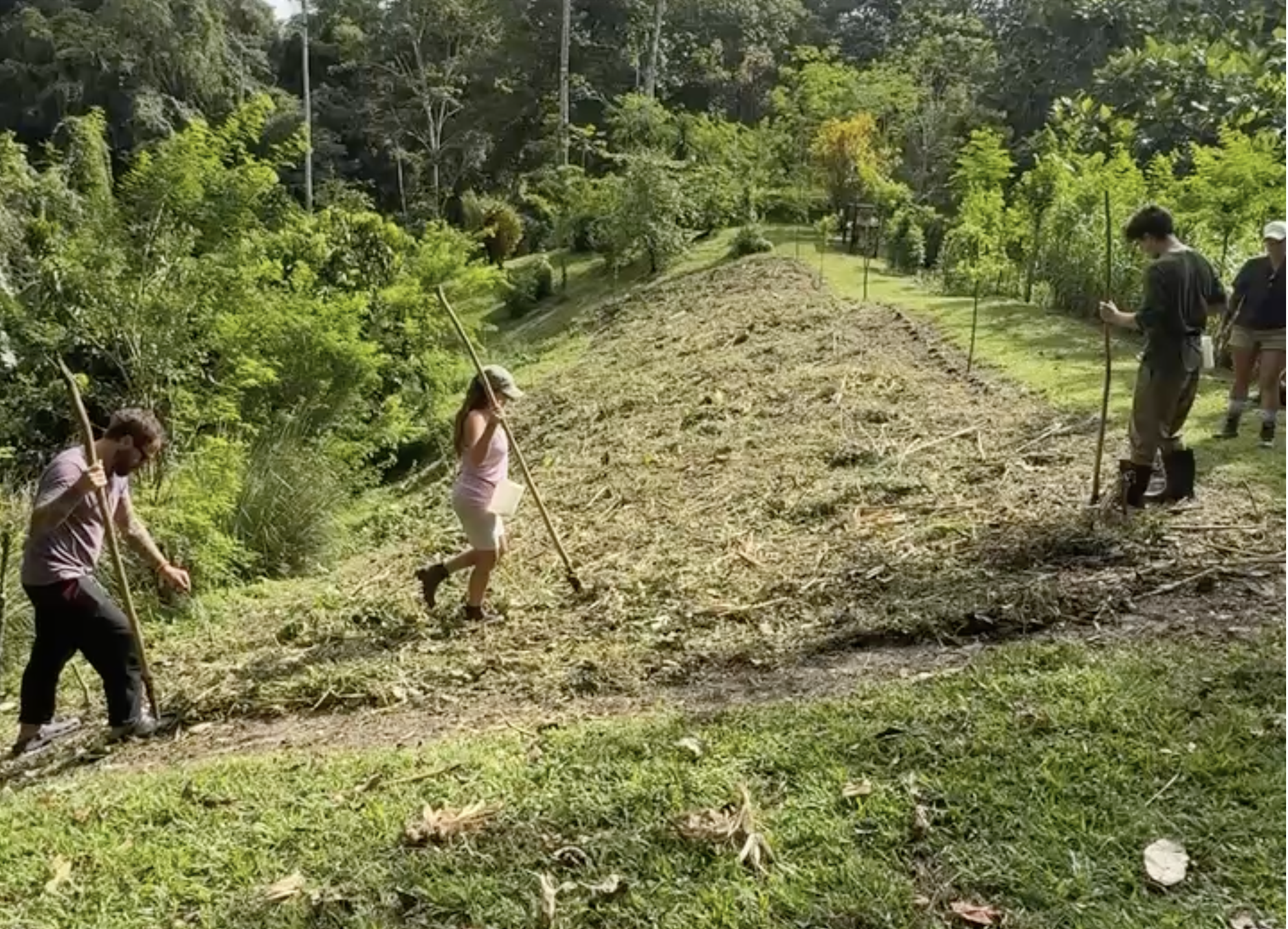
Permaculture Design Course
International Hands-On Certification in Costa RIca
Learn to design food forests, regenerative homesteads, and sustainable systems that thrive in any climate.
featured in
The Permaculture Design Course at Finca Tierra is an internationally recognized, hands-on certification program.
Students learn ecological design by working with real systems in the tropics: food forests, soil, renewable energy, and planning a food system that can feed people year round.
More than 1,000 students from 40+ countries have studied here during the past 15 years.
They observe, plant, harvest, and design within a working homestead.
This 15-day program is for people who want practical experience.
Designed for students, homesteaders, and professionals ready to design sustainable systems anywhere.
Duration: 15-day / 14-night
Certificate: International Standard PDC (72 hours)
Class Size: Limited to 12 participants
Meals: Farm to table, plant based
Lodging: Bamboo cabinas on-site
Location: Puerto Viejo de Talamanca, Costa Rica
Next class: Spring 2026 Permaculture Design Course: Sunday, April 12 – Sunday, April 26, 2026
Why Study at Finca Tierra
Finca Tierra is an off-grid education center and permaculture farm.
We generate our own solar power, harvest rainwater, and grow food systems that feed our family and students year-round.
Here, learning happens through real systems.
Agroforestry. Water. Energy. Soil. Food.
We live what we teach.
Curriculum Overview
Includes specialized training in Diet Design, from feeding a family to planning larger-scale production.
Design and Ecology
• Permaculture ethics and frameworks
• Site analysis and landscape design
• Pattern recognition and microclimates
• Climate-resilient planning
Water, Soil, and Food Systems
• Rainwater harvesting
• Greywater systems and biological treatment
• Composting and biochar
• Food forests, orchards, and staple crops
Plants and Propagation
• Seed saving
• Biointensive beds
• Propagation by seed, cutting, grafting, and rhizome
• Medicinal and edible crops
Natural Building and Energy
• Bamboo basics
• Small-scale renewable energy
• Waste to resource practices
Community and Regeneration
• Regenerative economics
• Ecovillage and community design
• Urban and suburban permaculture
Practical Skills
Mornings focus on skills learned on the land.
• Sharpening blades and tools
• Plant identification
• Food forest establishment
• Tree planting and support species
• Vegetable garden techniques
• Compost and biofertilizers
• Nursery management and potting soil
• Soil pH testing and balancing
• Swales, contouring, keypoints, and keylines
• Ferments, vinegars, and mead
What You Leave With
Each student completes a one-acre homestead design and leaves ready to apply permaculture anywhere.

Learning Approach
Hands-on experience
Half of class time is outdoors, working in mature systems.
Daily interaction
Observe water, waste, and food cycles in real time.
Practical skills
Composting, propagation, grafting, fermentation, mapping.
Design thinking
Apply systems logic to homes, farms, and communities.
Field trip
Explore indigenous land stewardship and ethnobotany.
The Permaculture Design Course — Day by Day
Day 1 — Arrival & Welcome Dinner
Arrive after 2 pm. Settle into your bamboo cabina and meet your cohort.
Farm-to-table dinner under the jungle canopy and an introduction to the 15-day learning experience.
Day 2 —Permaculture Ethics & Whole-System Thinking
Foundations of permaculture ethics, philosophy, and systems thinking.
Tour Finca Tierra’s off-grid infrastructure: solar, water, waste, gardens.
Day 3 — Ecosystem Patterns & Energy Flows
See how nature organizes through patterns and energy cycles.
Walk through food forests and main crop areas to study resilience and diversity.
Day 4 — Reading the Landscape & Mapping Designs
Learn mapping skills and terrain interpretation.
Sharpen tools, maintain food forest systems, and read natural landforms.
Day 5 — Tropical Planting & Pruning Techniques
Learn companion planting and pruning strategies in the tropics.
Establish new fruit trees and guide long-term productivity.
Day 6 — Water Harvesting & Soil Web Ecology
Build small earthworks for water retention.
Work with grains and staple crops that regenerate fungal soil networks.
Day 7 — Free Day
Our town offers a variety of activities like surfing, kayaking, snorkeling, diving, hiking the jungle and horse riding. Calypso in the beach bars all night!
Day 8 — Free Day
Explore the coastline. Swim. Rest.
Day 9 — Field Trip
Visit a traditional steward of the land.
Learn about indigenous cosmovision, natural building, ethnobotany, and the connection between people and forest ecosystems.
Day 10 — Building Living Soils & Biofertilizers
Create compost and biofertilizers.
Make and apply biochar, test soil pH, and use weeds as ecological indicators.
Day 11 — Earthworks & Resource Management
Use leveling tools to find contour and keypoints.
Apply earthworks that improve stability and water flow.
Day 12 — Design Across Climates & Garden Planning
Compare tropical, temperate, and arid strategies.
Begin your final design project.
Day 13 — Designing Aquatic Systems & Ponds
Study life in water.
Design small ponds and integrated aquaculture systems.
Day 14 — Regenerative Economics & Community Design
Zoom out to the community scale.
Explore bioregional systems, ecovillage design, and regenerative economics.
Present your final design and receive your PDC certification.
Day 15 — Farewell Breakfast & Departure
Breakfast and closing reflections.
Check out at 11 am. Leave ready to design your own sustainable future.
Accommodation
Stay in hand-built bamboo cabinas crafted from materials grown on our land.
Elevated and screened, each cabina offers jungle views and the feeling of sleeping in nature.
Cabinas
8 total: 4 private (queen), 4 shared (two singles)
Bamboo walls and floors
Large mosquito nets included
Facilities
Bathrooms with rainwater biological flush toilets
Solar-heated rainwater showers
Sheets, towels, organic biodegradable shampoo and soap included
Private cabinas are first come, first served once balnace payment is received.
Farm-to-Table Wellness Kitchen
We cook from the land.
Most ingredients come straight from our gardens.
We make our own flours, coconut milk, ferments, honey, and chocolate.
Meals are plant based, with free-range eggs, yogurt, and cheese.
We accommodate vegan and gluten-free diets. Please let us know when you register.
Dining here is part of the learning experience.
Students connect directly with the food systems they help cultivate.
Learn in a living system.
Step inside our tropical classroom.
Filmed on our off-grid campus, surrounded by nature.
Permaculture Design Course Dates
Winter A 2026 Permaculture Design Course: Sunday, January 4 – Sunday, January 18, 2026 (SOLD OUT)
Winter B 2026 Permaculture Design Course: Sunday, February 8 – Sunday, February 22, 2026 (SOLD OUT)
Fall A 2026 Permaculture Design Course: Sunday, September 6 – Sunday, September 20, 2026
Fall B 2026 Permaculture Design Course: Sunday, October 4 – Sunday, October 18, 2026
Fall C 2026 Permaculture Design Course: Sunday, November 1 – Sunday, November 15, 2026
Tuition & Registration
Tuition: $2,000 USD
Early Bird: $1,850 USD
(when paid in full 30 days before the course)
Reserve Your Place
$400 deposit to reserve your place
Balance transferable to future courses if plans change.
Balance Payment Options
Early Bird Balance: $1,450 USD
(if paid 30 days before the course)Standard Balance: $1,600 USD
(if paid after 30 days)
Accommodation Priority
Private bamboo cabinas with queen beds are limited.
They are allocated to the first participants who complete their balance payment, on a first-paid basis.
All cabinas are included in tuition. There is no additional cost for private accommodation.
What’s Included
All classes and hands-on training
Accommodation
All meals
Field trip
PDC certification
Not included: airfare and travel to and from Finca Tierra.
Language: English
Group size: Limited to 12 participants
Refund Policy
The $400 deposit holds your spot in your selected course dates.
Tuition (minus deposit) is refundable up to 30 days before the course.
Within 30 days, your balance may be applied to a future course.
Getting Here
Fly into San José (SJO).
Pre-arranged shuttles to Puerto Viejo leave daily at 6:00 am and 2:00 pm.
Check-in
Sunday after 2:00 pm
Arrival options
Arrive Sunday morning and take the 2:00 shuttle
Or arrive Saturday and take the 6:00 am shuttle Sunday
Check-out
Sunday before 11:00 am
More details on travel and what to bring are available here.
Certification & Credits
You will graduate with a Permaculture Design Certificate (PDC).
Recognized globally and listed on Permaculture Global.
Your certificate allows you to design, build, teach, consult, and certify others.
University students may receive academic credit.
Documentation available upon request.
Course Reviews
Read what past students have shared
-
A 72-hour, internationally recognized training in ecological design that teaches you to create food, water, energy, and waste-cycling systems that regenerate land.
-
At Finca Tierra in Puerto Viejo de Talamanca, Costa Rica—an off-grid tropical homestead and education center. In the middle of the jungle, 1.8 miles from pristine beaches and the town. -
Two weeks. Includes 72-hour instruction + hands-on projects, all meals, accommodation, materials, field trip, and a design project.
-
Yes—an International Permaculture Design Certificate (PDC) upon successful completion; to design, build, teach and certify others.
-
Founders Ian Macaulay and Ana Gaspar. They’ve taught students from 40+ countries and run the working systems you’ll study.
-
Yes. No prior experience required. The course scales from homestead to small-farm design.
-
Daily immersion in mature systems plus Diet Design & Wellness Kitchen—you learn to grow a complete, nutrient-dense diet and build a green home.
-
Site analysis, water harvesting, soil fertility & biochar, food forests & orchards, vegetable systems, plant propagation, natural building, renewable energy, grey/blackwater, seed saving, design thinking, regenerative economics, and community design.
-
12–16 for close mentorship and field time.
-
Hand-built bamboo cabinas on stilts with mosquito nets and shared warm rainwater showers. Private cabinas are first-come, first-served.
-
Seasonal Farm-to-table buffet, primarily plant-based with eggs and dairy; vegan and gluten-free on request. Includes ferments, coconut/cashew milks, local produce, and home staples.
-
Yes. Design principles are universal; techniques are adapted for any climate.
-
Mornings: hands-on practice. Afternoons: focused lectures and design work. One free day per week; one field trip (weather-permitting).
-
Fly to SJO. Shuttle to Puerto Viejo departs 6:00 am and 2:00 pm. Check-in Sunday after 2:00 pm; check-out the final Sunday at 11:00 am. -
Light tropical clothing, closed-toe shoes, headlamp, reusable bottle, rain layer, insect repellent, swimwear, notebook, and any personal medications. A full list is on the logistics and planning page.
-
$400 deposit is non-refundable. Tuition (minus deposit) refundable until 30 days before the start date. Balance due 30 days prior.
-
High-speed Wi-Fi. Power is off-grid, so it is limited at night.
-
Often yes. We provide documentation; confirm with your university advisor.
-
18+ Couples and solo travelers welcome.
-
Airfare, airport transfers, personal gear, and optional free-day activities.
-
Complete full payment early; private cabinas are allocated in order of payment received.
-
Occasional partial scholarships and group pricing for Universities/NGOs—email us.


































